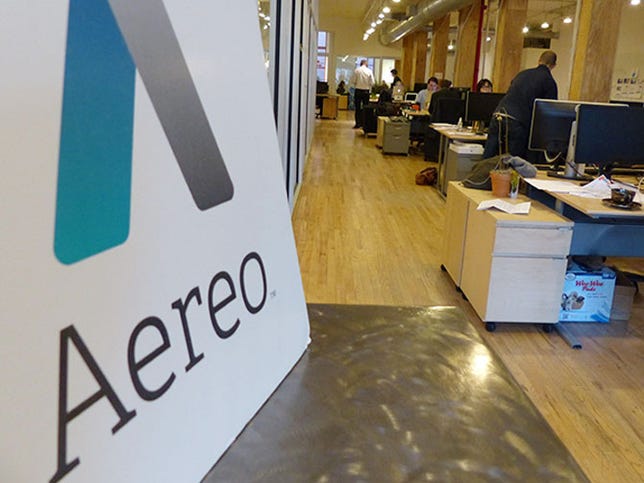
CNET
Aereo was dealt another setback in its fight for survival Thursday when a federal judge barred the embattled video streaming company from transmitting TV broadcasters’ programs to its subscribers.
US District Judge Alison Nathan in New York granted broadcasters’ request for a preliminary injunction against the service, which was shuttered in June after the Supreme Court ruled that Aereo was illegally retransmitting broadcast TV over the Internet. In her 17-page decision (PDF), Nathan rejected the startup’s claim that it would be irreparably harmed by not being allowed to retransmit programming.
“The Supreme Court has concluded that Aereo performs publicly when it retransmits plaintiffs’ content live over the Internet and thus infringes plaintiffs’ copyrighted works,” Nathan wrote in her opinion. “In light of this conclusion, Aereo cannot claim harm from its inability to continue infringing plaintiffs’ copyrights.”
Following the ruling, an Aereo representative said the company was examining its options.
“We are reviewing the decision and evaluating our options moving forward,” Aereo spokeswoman Virginia Lam said in a statement.
Launched in 2012 with the backing of IAC Chairman Barry Diller, Aereo uses antenna/DVR technology to let consumers watch live, local, over-the-air television broadcasts on some Internet-connected devices, including the iPad and iPhone. That capability provoked a lawsuit from TV broadcast giants including NBC, ABC, Fox, and CBS, which allege that the service violates their copyrights and that Aereo must pay them retransmission fees. (CBS, the parent company of CNET, is one of the broadcasters suing Aereo.)
Thursday’s ruling prohibits Aereo from retransmitting live broadcasting but doesn’t affect the service’s DVR business.
The ruling is the latest victory for broadcasters suing to shut down Aereo. The Supreme Court concluded that the streaming TV service was fundamentally the same as a cable company, but it doesn’t pay broadcasters the same fees cable companies must, a violation of the Copyright Act.
The company responded at the time by changing its legal argument, switching from a zero licensing model to a type known as a statutory license, a royalty system set up in the Copyright Act of 1976 that allows cable systems to retransmit copyrighted programming by paying royalty fees with the Licensing Division of the US Copyright Office. The case was returned to District Court after the US Circuit Court of Appeals in August denied Aereo’s request for further consideration of whether it was a cable company entitled to statutory license.
Noting that the Supreme Court concluded that Aereo performs in a similar fashion as cable TV providers when it retransmits broadcasters’ signals, Nathan said the service was “doing its best to turn lemons in to lemonade.”
Going forward, Nathan instructed both parties to submit a joint letter outlining how the case should proceed, indicating that the court intends to expedite the case to the formal trial stage.
CNET’s Joan E. Solsman contributed to this report.




